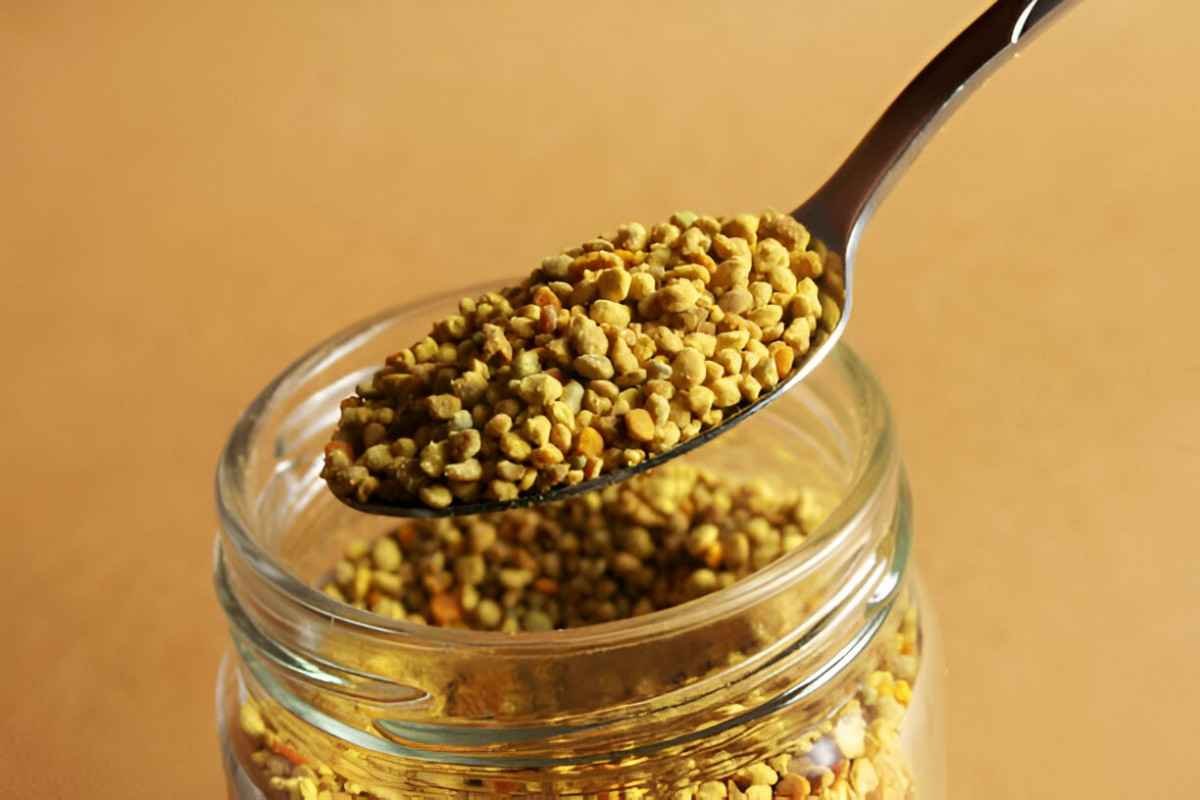Bee pollen is a nutrient-dense food collected by honeybees from flowering plants. It contains a mix of nectar, flower pollen, bee saliva, and other elements, making it a powerful supplement with various health benefits. This article delves into the nutritional values, key health benefits, potential therapeutic uses, cautions, and ways to incorporate bee pollen into your diet.
Summary Table
| Nutrient | Amount per tablespoon (15g) |
|---|---|
| Calories | 45-60 |
| Protein | 1.2-2 grams |
| Carbohydrates | 7-11 grams |
| Fats | 0.4-1 gram |
| Fiber | 1-2 grams |
| Vitamins | B-complex, C, E |
| Minerals | Calcium, magnesium, potassium, phosphorus, iron, zinc |
| Antioxidants | Flavonoids, carotenoids, polyphenols |
| Health Benefits | Description |
|---|---|
| Rich in Nutrients | Provides essential vitamins, minerals, and proteins |
| Antioxidant Properties | Reduces oxidative stress and risk of chronic diseases |
| Anti-Inflammatory Effects | Helps reduce inflammation in the body |
| Immune System Support | Boosts immune function |
| Allergy Relief | May reduce symptoms of seasonal allergies |
| Energy Boost | Enhances energy levels and combats fatigue |
| Digestive Health | Aids digestion and nutrient absorption |
| Potential Therapeutic Uses | Description |
|---|---|
| Wound Healing | Accelerates healing and reduces inflammation |
| Liver Health | Supports liver function and protects against damage |
| Hormonal Balance | May help balance hormones and alleviate PMS symptoms |
| Cautions | Description |
|---|---|
| Allergic Reactions | Risk for individuals with pollen allergies |
| Pregnancy and Breastfeeding | Consult a healthcare provider before use |
| Drug Interactions | May interact with certain medications |
Nutritional Values
Bee pollen is a rich source of vitamins, minerals, proteins, and antioxidants. The nutritional composition can vary depending on the plant source and geographical location, but a typical tablespoon (about 15 grams) of bee pollen provides:
- Calories: 45-60
- Protein: 1.2-2 grams
- Carbohydrates: 7-11 grams
- Fats: 0.4-1 gram
- Fiber: 1-2 grams
- Vitamins: B-complex vitamins (B1, B2, B3, B6, B9), vitamin C, and vitamin E
- Minerals: Calcium, magnesium, potassium, phosphorus, iron, and zinc
- Antioxidants: Flavonoids, carotenoids, and polyphenols
Key Health Benefits
- Rich in Nutrients: Bee pollen is packed with essential nutrients, making it a highly nutritious supplement that can contribute to overall health and vitality.
- Antioxidant Properties: The antioxidants in bee pollen, such as flavonoids and carotenoids, help combat oxidative stress, reducing the risk of chronic diseases like heart disease and cancer.
- Anti-Inflammatory Effects: Bee pollen has anti-inflammatory properties that can help reduce inflammation in the body, potentially benefiting conditions such as arthritis.
- Immune System Support: The vitamins, minerals, and antioxidants in bee pollen boost the immune system, helping the body to fend off infections and diseases.
- Allergy Relief: Some studies suggest that bee pollen can help reduce symptoms of seasonal allergies by desensitizing the body to certain allergens, although more research is needed.
- Energy Boost: Due to its rich nutrient content, bee pollen can enhance energy levels and combat fatigue, making it a popular supplement among athletes and those with busy lifestyles.
- Digestive Health: Bee pollen contains enzymes that aid in digestion and improve nutrient absorption.
Potential Therapeutic Uses
- Wound Healing: Bee pollen may accelerate wound healing and reduce inflammation when applied topically.
- Liver Health: Studies have shown that bee pollen can support liver function and protect against liver damage.
- Hormonal Balance: Bee pollen may help balance hormones and alleviate symptoms of menopause and premenstrual syndrome (PMS).
Cautions
While bee pollen is generally safe for most people, there are some cautions to consider:
- Allergic Reactions: Individuals with pollen allergies or sensitivities should avoid bee pollen, as it can cause severe allergic reactions, including anaphylaxis.
- Pregnancy and Breastfeeding: There is limited research on the safety of bee pollen during pregnancy and breastfeeding, so it is advisable to consult a healthcare provider before use.
- Drug Interactions: Bee pollen may interact with certain medications, such as blood thinners. Consult a healthcare professional before incorporating it into your diet if you are on medication.
How to Incorporate Bee Pollen into Your Diet
Bee pollen can be consumed in various ways:
- Smoothies: Add a tablespoon of bee pollen to your morning smoothie for a nutritional boost.
- Yogurt and Cereal: Sprinkle bee pollen over yogurt, oatmeal, or cereal.
- Salads: Use bee pollen as a topping for salads.
- Baking: Incorporate bee pollen into baked goods like muffins and energy bars.
- Water or Juice: Mix bee pollen into a glass of water or juice.
Bee pollen is a nutrient-rich supplement with numerous health benefits, including antioxidant properties, immune support, and potential therapeutic uses. However, individuals with allergies or on certain medications should exercise caution. Incorporating bee pollen into your diet can be done easily through smoothies, salads, and other foods, providing a natural boost to your overall health and well-being.





